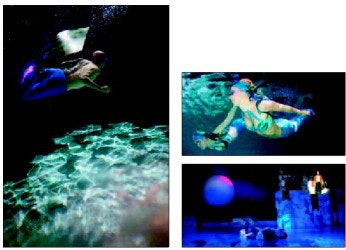
Missouri Town Has Something To Crow About
Companies donate pool equipment to community aquatic center.
The new Sheryl Crow Community Aquatic Center in Kennett, Mo., got a jump-start with four new Premium Efficient motors from Emerson Motor Company and pool pumps from Pentair Water Pool and Spa at the grand opening on Memorial Day weekend.
Rocker Sheryl Crow, a native of the southeastern Missouri community, donated both time and money to the pool's construction, and was there for the grand opening last spring to hand over the aquatic center keys to the City of Kennett.
Scott Rogers, advanced quality planning manager for Emerson, used to live in Kennett and worked with the chamber of commerce and the United Way Foundation on local community projects.
"Emerson is a long-time employer in Kennett and wants to help re-energize the city," he says. "This is a great way for the community to see Emerson at work together with the city."
Unbearable Heat
Hot bear seeks cool pool — and it's got the whole neighborhood abuzz.
Pool builders aim to create inviting backyard environments, and one such oasis hit that mark in a big way last May when a 200-pound female black bear beat a 90-degree heat wave by taking a swim in a backyard pool in the Granada Hills area of Los Angeles.
The bear was spotted wandering the neighborhood around 6:30 on a Sunday evening. According to The Daily News of Los Angeles , "Neighbors said at one point the bear was walking up and down the street, going up to residents' doors and windows. One man went up and down the street banging on doors and telling his neighbors to stay inside."
But when firefighters arrived, about 100 people came outside to watch her "bear-paddle" around a residential pool. Neighbors said she appeared to be "taking it easy." But all good pool parties must come to an end, and this one did when employees of the California Department of Fish and Game tranquilized the bear at 8:30 as she lounged poolside. She was eventually released unharmed in the Santa Susana Mountains.
The swimming bear caused quite a stir in the press, as well. A note about her aquatic adventure appeared in not only the Daily News , but also the Los Angeles Times , The Houston Chronicle , The Boston Globe , and even The Commercial Appeal out of Memphis, Tenn.
Operation Conservation
Two industry leaders dispel myth of hot tubs and pools as water hog.
When the West Coast had its infamous Enron-fueled energy crisis a few years back, hot tubs were one of the first appliances to be targeted as inefficient and unnecessary. Faced with the threat of a ban on hot tub use, Alice Cunningham of Olympic Hot Tub Company in Seattle went into crisis-management mode and organized a successful P.R. campaign that convinced government officials and the public in general that hot tubs weren't really an energy problem.
So when this summer's drought threatened to stir up similar issues with hot tubs and water use, Cunningham and her Puget Sound neighbor, Kathleen Carlson of Aqua Quip, along with support from APSP Region VIII, decided that a good offense would again be their best defense. Working with a crisis-management P.R. expert, they compiled a tip sheet and backgrounder that supplies all the ammunition one might need to argue that hot tubs are not the water hogs some might assume them to be. The document shows that hot tub use compares favorably to such residential water use as baths and lawn watering. It also provides suggestions for conserving water and recycling hot-tub water effectively.
Carlson and Cunningham figure that others will benefit from this P.R. effort when drought inevitably hits their part of the country, so they've arranged to distribute their conservation tip sheet throughout the industry via APSP membership.
For a copy of "Water Conservation for Pool and Spa Users," go to aquamagazine.com and follow the link.
Practicing Water Conservation
"Since we are in the business of using water for health, recreation and relaxation," starts the APSP Region VIII tip sheet. "It's important to us that water remains abundant and accessible for all. We believe this is possible if all pool and spa users are educated about water conservation techniques, and are willing to make just a few, sensible changes in their daily water consumption habits."
Here is just a sample of the water-conservation ideas generated by retailers facing drought in the Northwest.
- Properly maintained spa water needs to be replaced only two to three times a year and can be reused for landscape watering when drained.
- Maintaining pools and pool filtration systems decreases water use: – Use an automatic pool cleaner to maintain pool water. Pool cleaners that do not send debris through the filtration system help to reduce the need to backwash. – Proper maintenance of pool water reduces the frequency of backwashing. Replace your aging sand or D.E. filtering system with a cartridge filter that does not require backwashing and saves water.
- If it's clean, don't drain! Drain spas and pools only when you have a water-quality problem. Water only needs to be changed in a spa two to three times a year if you maintain your spa properly and it incorporates new water-cleaning technology. Pools only need to be drained if repairs require it.
- Reuse. When you do drain your spa, let it sit open for 48 to 72 hours with no new chemicals added, and then use the water on garden plants. Or, ask your retailer about products that neutralize chemicals.
- Use captured rainwater to replace water lost to evaporation in spas and pools or to begin the spa refill process.
The Skin You’re In
MLB teams up with dermatologists to fight skin cancer.
Pool professionals and pool users get lots of exposure to the sun, and the smart ones use sunscreen religiously. Anyone who doesn't use sun block when necessary may be interested in the results from a new survey conducted by the American Academy of Dermatology (AAD). It shows that teenage boys are the most neglectful when it comes to applying sunscreen, which helps explain why middle-aged and older men have higher rates of skin cancer than any other demographic. To combat this trend, two major league baseball teams, the Colorado Rockies and the Washington Nationals, are teaming up with the AAD to build awareness of skin cancer among players and fans. About 1 million new cases of skin cancer will be diagnosed this year and more than 10,000 people will die from this preventable disease, according to the AAD.
Baseball players and fans alike are out in the sun all summer, and several players have had skin cancer recently. Even commissioner Bud Selig has been diagnosed. This summer the Nationals worked with the AAD to conduct skin cancer screenings for the seventh year as part of the Play Smart When It Comes to the Sun program in which players serve as role models. May was the AAD's nationally recognized annual 'Melanoma Month,' when people were encouraged to adopt the lifelong habit of skin self-examinations.
The Little Mermaid Makes A Big Bicentenary Splash
Big Telly's production part of Hans Christian Andersen fête.
Fixing pool leaks sometimes requires a little underwater acrobatics, but nothing like what the cast of eight actors will be up to in the Big Telly Theatre Company's adapted version of Hans Christian Andersen's classic, "The Little Mermaid." That's because the actors, who have all swum competitively, will be swimming during the entire production, which takes place in a pool.
They will get some help. First, they'll be wearing monofins (think one giant flipper) and the company has also hired two full-time divers to help manage the underwater stunts and special effects. For instance, at one point, Neptune, King of the Sea, emerges to be seated on the surface of the water with no visible structure to rest on. In fact, divers beneath are holding him on a large wooden seat that the audience cannot see. Later in the show, the Prince and Princess spin around the surface of the water on top of a giant wedding cake, which is also operated by the divers beneath.
Artistic director Zoe Seaton told the BBC News that keeping the divers safe has been the biggest challenge: "They have had to work out their own underwater signals and cues because the actors are swimming extremely fast at this stage."
The actors, however, will not be gasping for air while swimming and trying to speak lines at the same time. The story will unfold with music, special lighting, puppets and visual effects.
Big Telly is based in Northern Ireland, but is bringing its show to swimming pools throughout the world this year, from Taiwan to Denmark, where it will be featured in the Hans Christian Andersen Bicentenary Anniversary Festival.
The pools used for the play do not need any special or additional treatment other than chlorine, says Hannah McKenzie, Big Telly's development manager, but the costumes, set and prop materials were all chosen carefully for compatibility.
Seaton says she is delighted to see the project become a reality: "We are extremely excited about the prospects for "The Little Mermaid" project and hope children and the young at heart will enjoy this unique adaptation of the famous story. Developing the performances in swimming pools is a challenge, but with valuable support from swimming experts, we have been able to create a production with a completely new approach."












































